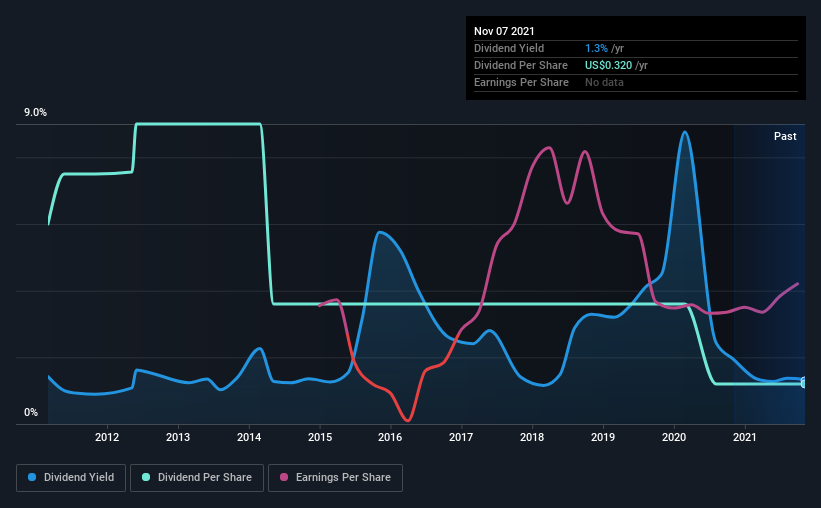Valhi, Inc.'s (NYSE:VHI) investors are due to receive a payment of US$0.08 per share on 23rd of December. This means the annual payment will be 1.3% of the current stock price, which is lower than the industry average.
Check out our latest analysis for Valhi
Valhi's Earnings Easily Cover the Distributions
If it is predictable over a long period, even low dividend yields can be attractive. However, prior to this announcement, Valhi's dividend was comfortably covered by both cash flow and earnings. This means that most of its earnings are being retained to grow the business.
EPS is set to fall by 13.5% over the next 12 months if recent trends continue. If the dividend continues along recent trends, we estimate the payout ratio could be 9.9%, which we consider to be quite comfortable, with most of the company's earnings left over to grow the business in the future.

Dividend Volatility
The company's dividend history has been marked by instability, with at least 1 cut in the last 10 years. Since 2011, the first annual payment was US$1.60, compared to the most recent full-year payment of US$0.32. The dividend has fallen 80% over that period. Declining dividends isn't generally what we look for as they can indicate that the company is running into some challenges.
Dividend Growth Potential Is Shaky
Dividends have been going in the wrong direction, so we definitely want to see a different trend in the earnings per share. Earnings per share has been sinking by 13% over the last five years. Such rapid declines definitely have the potential to constrain dividend payments if the trend continues into the future.
In Summary
Overall, it's nice to see a consistent dividend payment, but we think that longer term, the current level of payment might be unsustainable. The payments haven't been particularly stable and we don't see huge growth potential, but with the dividend well covered by cash flows it could prove to be reliable over the short term. We don't think Valhi is a great stock to add to your portfolio if income is your focus.
Companies possessing a stable dividend policy will likely enjoy greater investor interest than those suffering from a more inconsistent approach. At the same time, there are other factors our readers should be conscious of before pouring capital into a stock. For example, we've picked out 2 warning signs for Valhi that investors should know about before committing capital to this stock. Looking for more high-yielding dividend ideas? Try our curated list of strong dividend payers.
New: Manage All Your Stock Portfolios in One Place
We've created the ultimate portfolio companion for stock investors, and it's free.
• Connect an unlimited number of Portfolios and see your total in one currency
• Be alerted to new Warning Signs or Risks via email or mobile
• Track the Fair Value of your stocks
This article by Simply Wall St is general in nature. We provide commentary based on historical data and analyst forecasts only using an unbiased methodology and our articles are not intended to be financial advice. It does not constitute a recommendation to buy or sell any stock, and does not take account of your objectives, or your financial situation. We aim to bring you long-term focused analysis driven by fundamental data. Note that our analysis may not factor in the latest price-sensitive company announcements or qualitative material. Simply Wall St has no position in any stocks mentioned.
Have feedback on this article? Concerned about the content? Get in touch with us directly. Alternatively, email editorial-team (at) simplywallst.com.
About NYSE:VHI
Valhi
Engages in the chemicals, component products, and real estate management and development businesses in Europe, North America, the Asia Pacific, and internationally.
Excellent balance sheet with low risk.
Market Insights
Community Narratives


Recently Updated Narratives


MINISO's fair value is projected at 26.69 with an anticipated PE ratio shift of 20x


The Quiet Giant That Became AI’s Power Grid


Nova Ljubljanska Banka d.d will expect a 11.2% revenue boost driving future growth
Popular Narratives


The company that turned a verb into a global necessity and basically runs the modern internet, digital ads, smartphones, maps, and AI.


MicroVision will explode future revenue by 380.37% with a vision towards success



